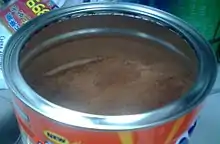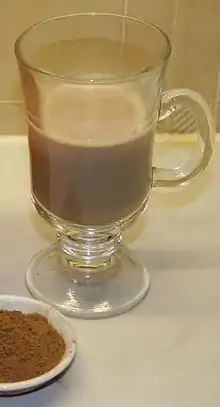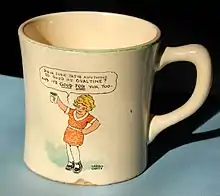Ovaltine
Ovaltine (Ovomaltine originally and in foreign markets) is a brand of milk flavoring product made with malt extract (except in the blue packaging in the United States), sugar (except in Switzerland), and whey. Some flavors also have cocoa. Ovaltine, a registered trademark of Associated British Foods, is made by Wander AG, a subsidiary of Twinings, which acquired the brand from Novartis in 2002,[1] except in the United States, where Nestlé acquired the rights separately from Novartis in the late 2000s.
 Taiwanese Ovaltine in its can | |
| Type | Malted dairy drink |
|---|---|
| Manufacturer | Associated British Foods or licensees (Nestlé in the United States) |
| Country of origin | Switzerland |
| Introduced | 1904 |
| Variants | Chocolate Malt, Malt, Rich Chocolate |
| Related products | Hot chocolate, Milo, Nesquik, Horlicks, Yoo-hoo, Vi-co |
| Website | www |
History
.jpg.webp)

Ovaltine was developed in Bern, Switzerland, where it is known by its original name, Ovomaltine (from ovum, Latin for "egg", and malt, which were originally its key ingredients). Soon after its invention, the factory moved out to the village of Neuenegg, a few kilometres west of Bern, where it is still produced.
Ovomaltine was exported to Britain in 1909. A misspelling of the name on the trademark registration application led to the name being shortened to Ovaltine in English-speaking markets. A factory was built in Kings Langley, which took it to the United States as well. By 1915, Ovaltine was being manufactured in Villa Park, Illinois, for the U.S. market. Ovaltine was later manufactured in Peterborough, Ontario, for distribution in Canada. Gerald Ethelbert Goldsmith was the president of the Ovaltine Foods at this time.[2][3]
Originally advertised as consisting solely of "malt, milk, eggs, flavoured with cocoa", the formulation has changed over the decades, and today several formulations are sold in different parts of the world. In India[4] and the UK, it no longer contains eggs.[5]
The popular chocolate malt version is a powder which is mixed with hot or cold milk as a beverage. Malt Ovaltine (a version without cocoa) and Rich Chocolate Ovaltine (a version without malt) are also available in some markets. Ovaltine has also been available in the form of chocolate bars, chocolate Easter eggs, parfait, cookies, and breakfast cereals.
Ovaltine also manufactured PDQ Chocolate Flavor Beads, PDQ Choco Chips, and Eggnog Flavored PDQ, which are no longer available. These drink mixes were very popular from the 1960s to the 1980s. Ovaltine discontinued the PDQ products around 1996.
Acquisitions
Villa Park, Illinois, was home to the Ovaltine factory in the United States from 1917 until the company's purchase and withdrawal in 1988. The Villa Park Historical Society maintains a permanent exhibit of Ovaltine advertising and memorabilia. The old factory was converted to loft apartments keeping the original floors and wall exposed.
In 1992, Himmel Group obtained the right to make and sell Ovaltine in the U.S. from Sandoz Nutrition Corporation. In 2002, Himmel sold their rights to Novartis. As of 2007, Nestlé had acquired Novartis' medical nutrition division and has the rights to Ovaltine.[6][7] With this purchase, Nestlé immediately ceased Ovaltine's previous television advertising campaign targeted to older and nostalgic audiences, where Ovaltine was presented as more nutritious than former competitor Nesquik, and though it is still sold widely in the United States, Ovaltine is currently not advertised on American television.
International appeal

Ovaltine was very popular in Britain, and was manufactured at Kings Langley in Hertfordshire using a process that included GEA Wiegand falling film evaporators to concentrate liquid malt extract which was then dried under vacuum in steam heated band dryers. The art deco style Ovaltine factory in Kings Langley is a well-known local landmark. Production ceased in 2002 and the factory has now been redeveloped as luxury flats. Near the factory was a health farm run by the Ovaltine works which was set up as a model farm and a health resort for disadvantaged children, which operated until the 1960s. Later, the farm land was sold and is now largely occupied by the M25 motorway. The Ovaltine Egg Farm is now the site of Renewable Energy Systems Ltd. and the site of the first wind turbine visible from the M25.
In October 2002, the food and drinks division of Novartis, the maker of Ovaltine, was bought by Associated British Foods. ABF currently produces Ovaltine in Switzerland, China, Thailand and Australia. In Canada, Ovaltine is produced by Grace Foods in biscuit and powdered drink forms. In the United States Nestlé manufactures Ovaltine.
In Hong Kong, Ovaltine, like Horlicks, is known as a café drink. It is served at cha chaan tengs as well as fast-food shops such as Café de Coral and Maxim's Express. It is served hot, or on ice as a cold drink. In Brazil, it is commonly mixed with vanilla ice cream. In the Asian market, it is a chocolate ice cream flavoured with Ovaltine powder. The Ovomaltine brand is highly recognizable in Switzerland, and the brand is associated with skiing and snowboarding. The McCafé in Hong Kong provides "Ovaltine Crunchy Latte" and other drinks and desserts.[8]
In Malaysia, Ovaltine has lost its popularity to Nestlé Milo. Ovaltine is sold in Tetra Pak cartons for cold serving and widely available in shops and supermarkets, yet it has a low profile compared to similar beverages in the market. In Japan, Ovaltine was sold for a short period in the late 1970s by Calpis Industries (presently Calpis Co., Ltd.), but it was not a commercial success. In Australia, Ovalteenies are sold as round tablets of compressed Ovaltine, eaten as candy.
Brazilian fast-food chain Bob's, the largest competitor to McDonald's in that country, offered, since 1959, milkshakes and sundaes made with Ovaltine, where it goes by the name of "Ovomaltine", which became a flagship product of the fast-food chain in Brazil. In 2016, McDonald's acquired exclusive rights to sell "Ovomaltine"-branded milkshakes. Brazil has the second largest Ovaltine factory, in São Paulo, and is the second largest consumer market for the product, after Thailand. The Brazilian Ovaltine is unlike any other in the world, originating from an assembly line malfunction that made the powder crispier that is still maintained today.[9]
In 2011, Ovaltine was banned in Denmark under legislation forbidding the sale of food products with added vitamins unless claims about their effectiveness are proven.[10] In 2014 this was reversed.

In popular culture
The U.S. children's radio series Little Orphan Annie (1931–1940) and Captain Midnight (1938–1949), and the subsequent Captain Midnight TV series (1954–1956), were sponsored by Ovaltine. They had promotions in which listeners could save proofs-of-purchase from Ovaltine jars to obtain radio premiums, such as "secret decoder ring" badges, or pins that could be used to decode messages in the program. Children from the time may remember that "Ovaltine" is an anagram for "Vital One".
Jean Shepherd offered a humorous (and slightly satirical) look back at the Little Orphan Annie Secret Circle, a club open only to children who had obtained the current Ovaltine decoder, in his story "The Counterfeit Secret Circle Member Gets The Message, or The Asp Strikes Again."[11] The story was dramatized as an episode in the film A Christmas Story.
Another radio program aimed at five- to fourteen-year-olds, The League of Ovaltineys, was broadcast to Great Britain by Radio Luxembourg on Sunday evenings at 5:30 PM. Beginning in February 1935, it was broadcast until September 1939, when the outbreak of World War II forced closure of the station, and again after the war from 1952. Like with the U.S. program, listeners could obtain badges, pins, and secret codes. The Ovaltineys' advertising jingle was regarded as one of the most successful jingles of the era,[12] and featured the popular English singing trio The Beverley Sisters.
The name of the brand is also featured in the 1972 Indian film Bawarchi starring Rajesh Khanna.
See also
- Akta-Vite
- Malted milk
- Horlicks
- List of chocolate beverages
- List of hot beverages
- Nesquik, another drink mix produced by Nestlé
- Nestlé Milo
- Ovaltineys
- Ovalteenies
- Postum
- Culinary Heritage of Switzerland
References
- "L'histoire". www.wander.ch (in French). Retrieved 30 August 2017.
- Vernon's Peterborough Directory, 1937, p. 342 "Wander, A., Ltd.
- Vernon's Peterborough Directory, 1960, p. 251, "Ovaltine Food Products"
- "Ovaltine Malt Beverage Mix 400g: Amazon.in: Grocery & Gourmet Foods". www.amazon.in.
- "Sainsbury's - Please enable cookies or JavaScript". www.sainsburys.co.uk.
- "Nestlé completes its acquisition of Novartis Medical Nutrition" (Press release). 2 July 2007. Retrieved 5 January 2017.
- "Brands | Ovaltine". The Himmel Group. 15 May 2007. Archived from the original on 20 January 2013. Retrieved 11 November 2012.
- "4款限定甜品+特飲登場!McCafé新推阿華田系列". hk.ulifestyle.com.hk/. Retrieved 13 June 2017.
- "Mundo S/A. Erro na receita do Ovomaltine agradou paladar dos brasileiros". GloboNews. 2 December 2011. Retrieved 11 December 2014.
- "Ovaltine, Vegemite Banned in Denmark". FOX News. 26 May 2011.
- Shepherd, Jean. In God We Trust, All Others Pay Cash (New York: Bantam Books), 1967.
- Street, Sean. Crossing the ether: pre-war public service radio and commercial competition in the UK. 2006, Indiana University Press, pp. 112–113
External links
| Wikimedia Commons has media related to Ovaltine. |
- Ovomaltine in the online Culinary Heritage of Switzerland database.
- Official site (in French and German)
- UK Ovaltine site
- USA Ovaltine site
- Villa Park Historical Society's Ovaltine Exhibit
- What Is Ovaltine, Please? by Brendan I. Koerner
